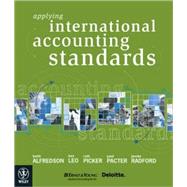
Ken Leo, BCom (Hons), MBA (QLD), AAUQ, ACA, FCPA, is professor of accounting at Curtin University of technology, Western Australia, During his 30 years as an academic, he has taught company accounting to undergraduate and postgraduate students, been a founding member of the Urgent issues Group, and been involved in writing books and monographs for a variety of organisations including CPA Australia, Group of 100 and the Australian Accounting research Foundation. he has served on the Australian Accounting Standards Board (AASB) Since 2002.
Ruth Picker, BA, FCA, FSIA, FCPA, is currently Ernst & Young's professional practice director (PPD) for the Oceania region. She is also a member of Ernst & Young's Global IFRS policy committee, which determines Ernst & Young's global interpretations of IFRSs. She is a frequent speaker and author on accounting and auditing issues. her written articles have been published in a number of accounting journals. She is a member of the editorial board of The Australian Accounting Review. Ruth was a member of the Urgent Issues Group for three years, and was subsequently appointed to the Australian Accounting Standards Board (AASB) in April 2000. In 2002 she was elected deputy chairman of the AASB, a position she currently holds. From 8 May 2003 until 15 November 2003, she was acting chairman of the AASB.
Paul Pacter holds two concurrent positions as the director of standards for small and medium-sized entities (SMEs) at the International Accounting Standards Board in London, and director in the Global IFRS office of Deloitte Touche Tohmatsu in Hong Kong. Previously, Paul worked for the US Financial Accounting Standards Board for 16 years, and was commissioner of finance of the City of Stamford, Connecticut, for seven years. he received his PhD from Michigan State University and is a CPA. He has taught in several MBA programs for working business managers.
Jennie Radford, BCom, DIPEd (Melb), Mcom (Curtin), ACA, is currently a lecturer at Curtin University of Technology. She has co-authored two research monographs published by the Group of 100 and the ASCPA. She has also contributed to and co-edited a textbook, Financial Accounting Issues. She was for many years employed as an auditor with the 'Big 5' Chartered accounting firms. Jennie has taught undergraduate and postgraduate courses in her career as an academic. She is a member of the Western Australia Cell of the External Reporting Centre of Excellence (ASCPA).
|
|||
|
|||
|
|||
|
|||
| PART 1: FRAMEWORK. | |||
|
|||
|
|||
| PART 2: ELEMENTS. | |||
|
|||
|
|||
|
|||
|
|||
|
|||
|
|||
|
|||
|
|||
|
|||
|
|||
| PART 3: DISCLOSURE. | |||
|
|||
|
|||
|
|||
| PART 4: ECONOMIC ENTITIES. | |||
|
|||
|
|||
|
|||
|
|||
|
|||
|
|||
|
|||
|
|||
|
|||
|
|||
|
The New copy of this book will include any supplemental materials advertised. Please check the title of the book to determine if it should include any access cards, study guides, lab manuals, CDs, etc.
The Used, Rental and eBook copies of this book are not guaranteed to include any supplemental materials. Typically, only the book itself is included. This is true even if the title states it includes any access cards, study guides, lab manuals, CDs, etc.